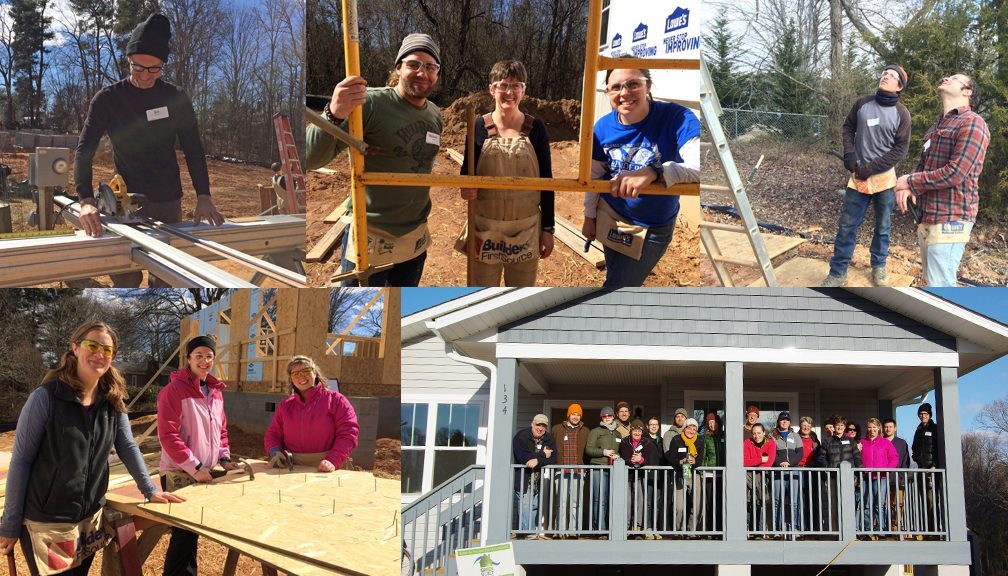A Treasured Partnership
By Kristen Keefer
For ten years, Asheville Area Habitat has been partnering with Asheville Hampton Inn. The hotel network includes three Hampton Inns and one Homewood Suites by Hilton. Brenda Durden (pictured above), Chief Operating Officer for nearly 27 years, established this partnership ten years ago when her office reached out to Habitat about a renovation project. Brenda explained, “We have a great desire to give back to our community and support the work of several local organizations and Habitat was a great fit for us.”
When it is time to renovate one of the four hotel locations, Brenda reaches out to Habitat. Brenda shared, “We have donated thousands of items through the years with the hope of supporting a great organization doing great things in our community.”
ReStore associates and volunteers led by ReStore Donations Manager Jeff Bridgman or Deconstruction Specialist Dylan Haynes, assist in the quick removal of items like lamps, tables, sofas, artwork, televisions, cabinets, and granite tops. Brenda noted, “The team at Habitat comes in ready to jump in and help with whatever it takes to quickly remove items. Jeff coordinates the best people to handle every aspect of our donations. He is on site, so appreciative and easy to work with. He makes our partnership one that we treasure.”
In addition to removing furniture and accessories, the ReStore’s Deconstruction team, led by Haynes, has also removed installations like kitchen cabinets and bath vanities from select properties.
By partnering with Habitat, Asheville Hampton Inn ensures that the items removed will not be discarded into a landfill. Instead, the donated items are sold affordably at the ReStore and proceeds contribute to funding affordable housing in our community. Both of these aspects are important to Brenda and align with Hampton Inn’s community-oriented values. Brenda explained, “By donating we know we are making a decision that is best for the landfill and helping Habitat be successful.”
Brenda has done an incredible job establishing and continuing a strong partnership between the ReStore and Asheville Hampton Inn. We are grateful for her efforts, as well as the partnership. On behalf of the ReStore, thank you Brenda, for all that you do! And, for the generosity of Asheville Hampton Inn and all the hardworking people that help make this alliance possible. We look forward to continued partnership in the years to come!
If you’re interested in becoming a ReStore Business Partner, please click here to learn more.
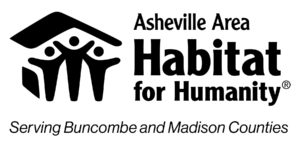
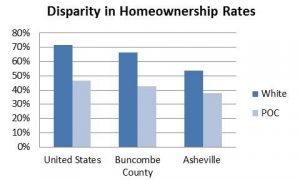
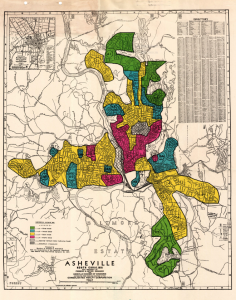
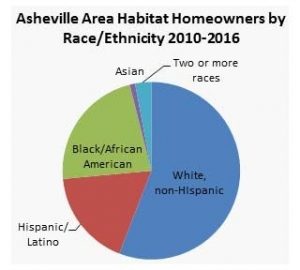 Habitat creates a way for households facing economic barriers to achieve homeownership and begin to close the wealth gap, but we can’t do it alone. To achieve equity in rates of homeownership nearly 3,000 additional households of color in Buncombe County will need the opportunity to become homeowners. To achieve this scale, we will need many more lenders to adopt policies that help households of color overcome historical barriers to mortgage loans. We need to grow housing and financial counseling opportunities to help aspiring homebuyers become “mortgage ready”. We need more affordable rental options and tenant advocacy so that renters have the stability needed to save and prepare for future ownership. Finally, we need home repair and foreclosure prevention assistance to help existing homeowners to remain at home. In short, it will take everyone committing to give our time, our financial support, and our voices to advance the dream of equality of opportunity for all our neighbors regardless of race.
Habitat creates a way for households facing economic barriers to achieve homeownership and begin to close the wealth gap, but we can’t do it alone. To achieve equity in rates of homeownership nearly 3,000 additional households of color in Buncombe County will need the opportunity to become homeowners. To achieve this scale, we will need many more lenders to adopt policies that help households of color overcome historical barriers to mortgage loans. We need to grow housing and financial counseling opportunities to help aspiring homebuyers become “mortgage ready”. We need more affordable rental options and tenant advocacy so that renters have the stability needed to save and prepare for future ownership. Finally, we need home repair and foreclosure prevention assistance to help existing homeowners to remain at home. In short, it will take everyone committing to give our time, our financial support, and our voices to advance the dream of equality of opportunity for all our neighbors regardless of race.